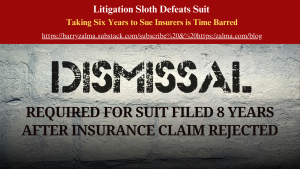Litigation Sloth Defeats Suit

Post 4821
See the full video at https://rumble.com/v50y5hz-litigation-sloth-defeats-suit.html and at https://youtu.be/3i5ISVONoeo
The appellate courts of the state of New York are noted for their ability to resolve an appeal quickly and with brevity.
The Supreme Court, the trial court, dismissed plaintiffs’ complaint against Allied World National Insurance Company as time-barred because plaintiffs commenced this action eight years after Allied’s disclaimer of insurance coverage.
In Kent Avenue Property 3, LLC, et al. v. Allied World National Assurance Company, Scottsdale Insurance Company, Appeal No. 2448, 2024 NY Slip Op 03086, Index No. 814800/21, Case No. 2023-05552, Supreme Court of New York, First Department (June 6, 2024) the New York appellate Court resolved the dispute.
FACTS & ANALYSIS
The Supreme Court, Bronx County (Fidel E. Gomez, J.), entered May 30, 2023 denied plaintiffs’ cross-motion for summary judgment declaring that defendant Allied World National Assurance Company (Allied) is obligated to defend and indemnify plaintiffs. The court granted Allied’s motion to dismiss the complaint as against it and dismissed the complaint in its entirety.
In September 2013, plaintiffs “possessed sufficient information… to formulate the factual basis for [the] assertion” that the disclaimer was untimely under Insurance Law § 3420(d)(2), and thus, the statute of limitations began to run. Accordingly, plaintiffs’ action commenced on October 29, 2021 was found to be time-barred under the six-year (CPLR 213[1]) statute of limitations.
The appellate court concluded that the Supreme Court properly searched the record and dismissed the complaint against the remaining defendant Scottsdale Insurance Company since the claims were similarly time-barred.
In view of the foregoing, the court properly denied plaintiffs’ cross-motion for summary judgment as moot.
Statutes of limitation exist to protect litigants against stale claims. The state of New York’s limitation period is six years. The decision of the trial court and the appellate court were obvious, the appeal was unworthy, and proved that you can’t just sue an insurance company and always get rich, especially when you wait 8 years after the claim is rejected to file a suit.

(c) 2024 Barry Zalma & ClaimSchool, Inc.
Please tell your friends and colleagues about this blog and the videos and let them subscribe to the blog and the videos.
Subscribe to my substack at https://barryzalma.substack.com/subscribe
Go to X @bzalma; Go to Newsbreak.com https://www.newsbreak.com/@c/1653419?s=01; Go to Barry Zalma videos at Rumble.com at https://rumble.com/c/c-262921; Go to Barry Zalma on YouTube- https://www.youtube.com/channel/UCysiZklEtxZsSF9DfC0Expg.
Go to the Insurance Claims Library – https://lnkd.in/gwEYk
Like this:
Loading…
Related
About Barry Zalma
An insurance coverage and claims handling author, consultant and expert witness with more than 48 years of practical and court room experience.







